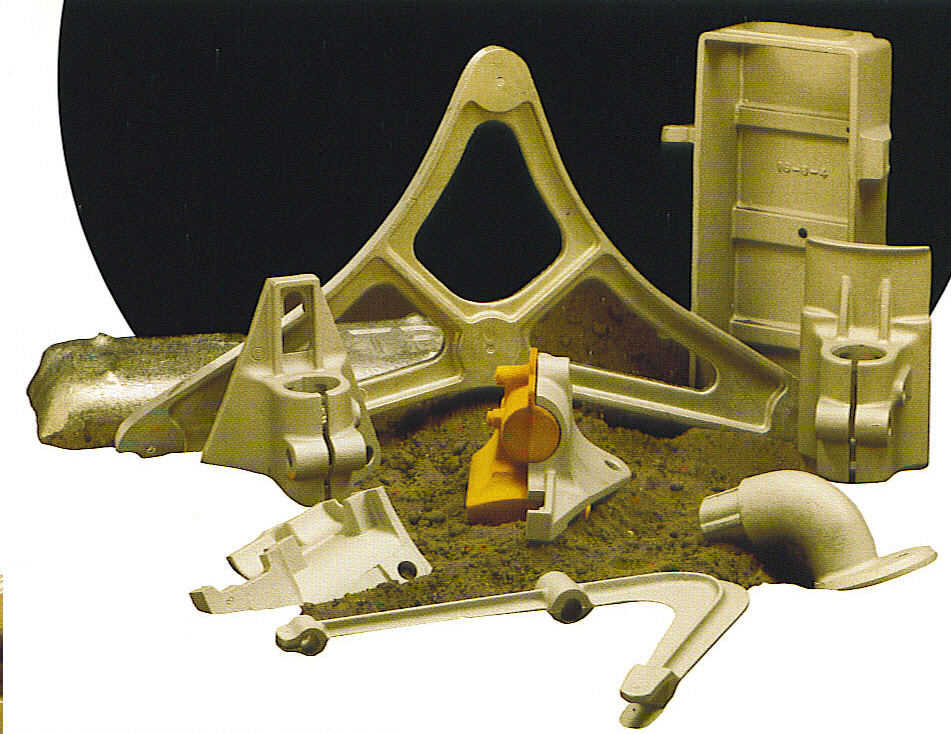Top 5 industries that rely on Metal Castings for precision parts
Wiki Article
The Important Uses of Aluminum Foundry in Different Industries and Their Impact
Aluminum factories function as a necessary resource within countless markets. Their lightweight and durable products considerably boost efficiency in automobile, aerospace, building and construction, and electronics markets. As each sector leverages aluminum's special homes, they likewise add to sustainability initiatives. This diverse effect motivates a much deeper expedition of just how Aluminum formed these markets. What specific developments and benefits develop from its usage?Automotive Industry Applications
The automobile industry progressively relies upon Aluminum Foundry applications to enhance automobile efficiency and effectiveness. Light weight aluminum's light-weight nature contributes greatly to sustain economy, making it a favored choice for suppliers intending to minimize discharges and boost overall car dynamics. Components such as engine blocks, transmission housings, and wheels are frequently created with Aluminum casting processes, permitting for intricate layouts that fulfill rigorous safety and performance standards.
Aerospace Innovations

The use of aerospace-grade Aluminum alloys boosts resistance to corrosion and tiredness, essential for the requiring settings aircraft face. Developments in additive manufacturing also enable quick prototyping and personalization of parts, decreasing preparations and prices.
Building and Framework
While the construction and infrastructure sectors remain to progress, Aluminum shops are significantly identified for their payments to contemporary structure practices. Aluminum's light-weight nature and high toughness make it an ideal product for different architectural applications. Factories supply parts such as beam of lights, frames, and facades that improve the resilience and long life of buildings and infrastructure jobs.Additionally, light weight aluminum's deterioration resistance plays a vital role in prolonging the life-span of frameworks exposed to harsh environmental conditions. The energy effectiveness of Aluminum products likewise lines check that up with lasting building efforts, adding to reduced energy intake in building and construction. Furthermore, innovative spreading strategies have expanded the style possibilities, enabling engineers and engineers to develop aesthetically pleasing yet functional structures.
Electronics Manufacturing
Aluminum foundries play a considerable duty in the electronic devices producing market, where the need for thermally conductive and lightweight products is extremely important. Aluminum Foundry. Elements such as warmth sinks, housings, and brackets are often created utilizing Aluminum as a result of its outstanding thermal residential or commercial properties and ability to dissipate warmth effectively. This is vital in electronic devices, where getting too hot can lead to failing and decreased performanceThe flexibility of Aluminum permits complex styles and exact machining, which are important in modern electronic devices. In addition, aluminum's non-magnetic buildings make it ideal for applications in sensitive electronic devices, lessening disturbance. Light weight aluminum's resistance to corrosion improves the longevity of electronic elements, making certain durability and reliability.
Sustainability and Reusing Efforts
Given the increasing focus on environmental responsibility, the Aluminum Foundry industry has made considerable strides in sustainability and recycling initiatives. Aluminum is inherently recyclable, allowing foundries to recycle and reclaim product with minimal power expenditure contrasted to primary production. This closed-loop recycling procedure not only minimizes waste but also reduces greenhouse gas discharges, adding to an extra sustainable manufacturing design.Several shops are embracing energy-efficient technologies, consisting of renewable power resources, to power their procedures. This change not only decreases reliance on nonrenewable fuel sources but likewise boosts overall functional efficiency
Market collaborations are additional promoting lasting methods, such as sharing best practices and developing ingenious recycling approaches. By prioritizing these efforts, the Aluminum Foundry market is placing itself as a leader in sustainable production, straightening with international targets for sustainability while fulfilling the demands of various markets.

Frequently Asked Inquiries
What Are the Primary Benefits of Utilizing Aluminum in Foundry Processes?
The main benefits of making use of Aluminum in Foundry processes include its lightweight nature, superb corrosion resistance, high thermal and electric conductivity, and convenience, permitting for detailed layouts and reliable recycling, eventually improving total production here are the findings efficiency and lowering prices. - Metal CastingsHow Does Aluminum Foundry Influence Item Lifecycle Management?
Aluminum Foundry significantly boosts item lifecycle administration by allowing efficient product usage, decreasing waste, and facilitating recycling. Its light-weight homes boost transport performance, Read More Here while durability expands item life-span, eventually contributing to sustainability and cost-effectiveness in manufacturing.Exist Details Challenges in Aluminum Foundry Production?
Certain obstacles in Aluminum Foundry production consist of taking care of temperature control, making certain worldly top quality, decreasing waste, and adjusting to varying market demands. These elements can affect effectiveness, cost, and general competitiveness within the sector.What Safety And Security Steps Are Essential in Aluminum Foundry Workflow?
Important security measures in Aluminum Foundry procedures consist of individual safety tools, correct ventilation, normal tools maintenance, danger interaction, and emergency situation action training. Applying these methods warranties worker safety and decreases risks connected with high-temperature steel processing.Just how Does the Cost of Aluminum Compare to Various Other Steels in Foundry Use?
The price of Aluminum is generally less than that of metals like copper and titanium, making it a cost-efficient option for several Foundry applications. This price adds to its prevalent usage throughout numerous sectors.Aluminum shops serve as a crucial source within numerous markets. The vehicle industry progressively depends on Aluminum Foundry applications to improve lorry performance and efficiency. The product's recyclability likewise lines up with the sector's push towards sustainability, as recycled Aluminum requires considerably much less power to process contrasted to main light weight aluminum. Aluminum factories play a significant function in the electronics producing sector, where the need for thermally conductive and light-weight materials is vital. Provided the increasing focus on ecological responsibility, the Aluminum Foundry market has actually made significant strides in sustainability and recycling initiatives.
Report this wiki page